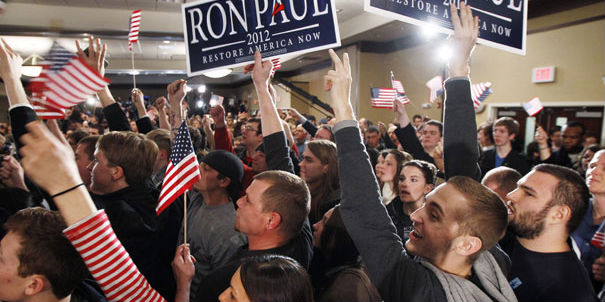The Pew Research Center surveyed upward of 10,000 adults from January to March in an attempt to pin down the latest and greatest of today’s partisan shifts and voting tendencies.
Videos by Rare
Pew categorized those who vote Republican every time as “Steadfast Conservatives” and “Business Conservatives” and those who vote Democrat as “Solid Liberals.” Beyond this there are the “less partisan, less predictable” voters who’ve been given the title “young outsiders.”
These “Young Outsiders” could otherwise be referred to as Millennials, an age group that is inherently more suspicious of government, socially tolerant and party independent — or libertarian-minded, for short.
The Pew Study defined the “Young Outsider” in the following manner:
Young Outsiders lean Republican but do not have a strong allegiance to the Republican Party; in fact they tend to dislike both political parties. On many issues, from their support for environmental regulation to their liberal views on social issues, they diverge from traditional GOP orthodoxy. Yet in their support for limited government, Young Outsiders are firmly in the Republicans’ camp.
What this reveals is that “Young Outsiders” are both “Steadfast Conservatives” and “Business Conservatives” but, under certain conditions — namely, limited government, fiscal responsibility, social tolerance and eradicating crony capitalism — that must be essential priorities of the conservative platform.
If the Republican Party isn’t doing these things then the “Young Outsiders” don’t feel they have to stick around — they are outsiders after all and seem comfortable in that role.
The Pew study noted that “Young Outsiders'” views on social tolerance don’t perfectly fit what the Republican Party mainstream has been, yet, with time, that could change. Even now, “Young Outsiders favor the Republican candidate, or lean Republican, by a 53% to 33% margin,” for reasons of fiscal responsibility and limited government philosophy.
But politicians like Sen. Rand Paul (R-Ky.) have tried to reach out to the “Young Outsiders,” having realized the irresponsibility of alienating them over social issues when there is value for conservative movement in other areas of interest.
5 ways Rand Paul is trying to grow the Republican Party
Sen. Paul was hailed by Young Americans for Liberty’s Executive Director Jeff Frazee as “a giant step in the right direction” when it comes to putting forth the ideas the libertarian youth movement values most in the Republican Party.
“The size and the scope of the problem of government is causing young people to seek bigger ideas and bigger solutions,” Frazee said. “As a pure libertarian, [Paul] might not be perfect but he is a man with principles and a love for liberty.”
“Young Outsiders” — in case you needed more proof that’s synonymous with Millennial libertarians — are frustrated with the size of government.
When asked whether “Young Outsiders” trusted government or not, a whopping 84 percent responded with “Only some of the time/Never” compared to 16 percent who said “Always/Most of the time,” and when asked about their feelings about the federal government, 88 percent said they were “Angry” or “Frustrated,” while just 12 percent said they were content.
And, as Matthew Hurtt notes for United Liberty, “[Young Outsiders] disapprove of Obamacare 71%-25% … support marijuana legalization 67%-31% … [and] support gun rights over gun control 63%-35%,” each of which are supported by conservative arguments.
S.E. Cupp pointed out in March — without using the term “Young Outsiders” — that Millennials will make up two-thirds of the voting population by 2020. For that reason alone, it makes sense for the Republican Party to grow up with Millennials.
But if you take a closer look at what “Young Outsiders” value you might find that that’s a lot more conservative than you thought.



